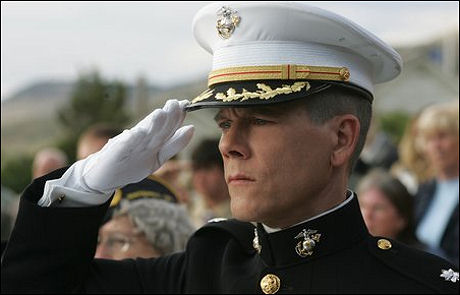Ross Katz‘s Taking Chance, a somber, well-made drama about youth, grief and terrible finality, is an infuriating film because it’s also, for me, a sneaky Iraq War sell-job in sheep’s clothing. It will have its premiere on HBO this Saturday, 2.21, at 8pm. So it seems time to re-run some of my original 1.17.09 review that I wrote at the Sundance Film Festival.

Kevin Bacon in Ross Katz’s Taking Chance
Taking Chance “moves you with understated eloquence about the profound and lasting sadness of a young man dying in a war (any war) with so many decades of potentially rich life taken from the soldier and his loved ones and his unborn children. But the movie does something else. It sells the honor and glory of combat death in a ‘sensitive’ way that is not only cloying but borders on the hucksterish. Which I feel is a kind of obscenity.
“One result of this sell job is that it lends an aura of dignity and nobility to a conflict that was launched upon lies and neocon arrogance and idiocy, and that war simply doesn’t deserve the respectful salute that Taking Chance obliquely extends.
“I’m not objecting to this film offering a modest and moving tribute to our fallen dead. I was in fact moved by this. But Katz knows full well that Bush, Cheney, Rummy and Wolfowitz will cream in their pants when they see this thing. Is he proud of this? Because I think Taking Chance is catering, in a roundabout way, to not just the red-state sentiments that have prolonged the Iraq War (and which certainly prolonged the Vietnam War) but the kneejerk neocon thinking that has also kept us in that terrible situation.
“The fundamental objection I have to Katz and the film is the underlying spin behind the general honoring of brave young men suffering ghastly death and mutilation under the wind-whipped stars and stripes.
“James Garner‘s Americanization of Emily speech [see above] talks about the obscenity of selling the valor of war death — the tributes, statues and Memorial Day parades that praise and worship the act of being killed in combat — because it perpetrates the carnage through decades and generations and centuries.
“We shall never end wars,” Garner says, “as long as we make heroes of our dead and shrines of our battlefields. The fact is that we perpetuate war by exalting its sacrifice. It may be ministers and generals and politicians who blunder us into war, but the least the rest of us can do is to resist honoring the institution.”
I’m ready to rock and rumble with anyone who’s caught an advance screener and doesn’t agree, or who intends to see it this weekend and wants to get into it then.












